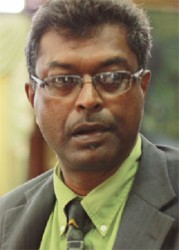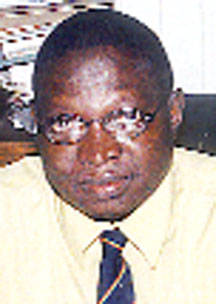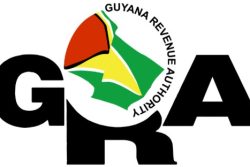Leader of the Alliance For Change (AFC), Khemraj Ramjattan has called the Clerk of the National Assembly’s refusal to convene Parliament as requested by the Speaker an act of insubordination.
Speaking to Stabroek News yesterday, Ramjattan said that “at this stage we did not anticipate this because we felt that the argument that the legislative branch is separate from the executive branch should not be compromised by any administrative arrangement by the Clerk.”
Opposition Leader David Granger could not be reached yesterday for comment on Isaacs’ decision.
Ramjattan told Stabroek News that he believed that the Head of the Presiden-tial Secretariat, Dr Roger Luncheon “had a lot to do with this,” in reference to the Clerk, Sherlock Isaacs’ decision to refuse to convene the National Assem-bly at the request of the Speaker of the House, Raphael Trotman.
The leader of the AFC stated that “I understand that they (government) were lobbying him (Isaacs) and they were trying to get at him and persuade him not to hold (the sitting) on (November 6th)”. He continued that there has been “unjustified interference in the legislature by senior executive ranking members.”
Ramjattan noted that “the Clerk in the hierarchy of the National Assembly comes below the Speaker who is the leader of the legislative branch and the Clerk’s position by nomenclature is clerical (and) to do the clerical matters to ensure that the legislative branch gets its operational matters in place.”
He said that the Speaker’s authority to set a date for Parliament under Standing Order 8(2) was affirmed by former Speaker of the House, Ralph Ramkarran as well as Trotman. “To not go and set this date … and (defying) the legal opinion of three speakers is in my book insubordination,” he said.

Ramjattan stated that the Clerk has the responsibility to work under the instruction of the Speaker. “The instruction by the Speaker, how would that be different than the Prime Minister would say to him to set the date? The Standing Order 8(2) is saying that the Speaker can set the date just like the Prime Minister could.”
He called the clerk’s decision irresponsible given the political climate. Ramjattan said that while going forward was a wait-and-see process the Speaker had options. He said that while the Clerk was not acting there was nothing preventing the Speaker from rallying ranks underneath the Clerk and requesting they execute his instructions.
“It could be the Speaker could get the deputy or staff members to execute ihis instruction by sending them to buy the airfare for MPs, out of town… because something has to be done,” the AFC leader stated.
When questioned on the Speaker’s decision to accept the Clerk’s interpretation although it differed from his own, Ramjattan stated that he did not wish to comment on that matter.
If Trotman circumvents the Clerk’s interpretation of the Standing Orders, observers say the government could move to the courts.
In a statement issued on Wednesday, Trotman stated that “the effect of the Clerk’s decision not to convene the sitting has the effect of crippling the ability of the Members of Parliament to meet” continuing that “this in itself brings the Constitution into derision and disregard and cannot be what the framers of our Constitution intended.”

The Speaker said that the roles of both the Speaker and Clerk are regulated by the Constitution and the Standing Orders. He said that “The Speaker performs the role of “Presiding Officer” once the Assembly is convened; whilst the function of convening the National Assembly remains the sole preserve of the Clerk.”
Trotman wrote that “As constitutional officers, both are expected to work symbiotically for the National Assembly to be able to properly discharge its constitutional roles and functions. It is the duty of the Clerk to convene the sitting by making all arrangements including, summoning and ensuring the attendance of Members, and the preparation and circulation of the Order Paper.”
He said that the “unfortunate position arrived at” by Isaacs is due to a “very narrow interpretation of the Standing Orders and of the prevailing circumstances whereby the National Assembly entered into recess and has emerged from that recess, and a majority of Members desire to meet.”
During the Parliamen-tary recess, from August 10-October 10, Trotman had stated that he was not opposed to calling an emergency sitting of the House if the majority of the members had made the request.
Wake
In the wake of Isaacs’ decision, observers say that the Speaker should also be seeking the advice of regional counterparts as the Clerk did. Isaacs had on Tuesday sought advice from Clerks across the Region including Trinidad and Tobago’s Clerk of the House and consultant to the drafting of Guyana’s Standing Orders, Jacqui Sampson-Meiguel. She was of the view that the Speaker’s request should be obliged and the government could then take the matter to the courts.
Jamaica’s Clerk to the House of Parliament, Heather Cooke, who was also contacted by Isaacs, wrote and stated that based on readings of Jamaica’s, Guyana’s and the United Kingdom’s Standing Orders, the Speaker could only adjust a date for the House to meet but could not set one.
The opposition has been pressing for the convening of Parliament but since the end of the recess, questions have arisen as to who had the power to call a sitting. Isaacs had advised Trotman that such power did not reside in the speakership. However, Trotman after consulting with former speakers had arrived at the conclusion that sittings could be held based on the Standing Orders and he asked Isaacs to convene one. With this being nixed, the focus will now shift to government Chief Whip Gail Teixeira who has been accused by Opposition Chief Whip Amna Ally of dilly-dallying with the date.
Teixeira has remained quiet on the matter although Stabroek News has attempted to make contact since the Parliament Management Committee meeting which dictated that the two whips would be tasked with setting a date since the House recess ended on October 10. The government Chief Whip issued a statement on Friday last noting that the setting of a date for Parliament was pending the outcome of talks between President Donald Ramotar and the Leader of the Opposition David Granger. This was debunked by APNU’s General Secretary, Joseph Harmon who stated subsequently that setting a date for the sitting was not on the agenda for the meeting.
During his post cabinet press briefing on Wednes-day, Luncheon stated that a decision would be made this week. Observers have noted that the government appears to be stalling the sitting of the House because of the looming Alliance For Change no-confidence motion.
In his Sunday Stabroek column this week, former two-term speaker, Ralph Ramkarran said that it has been wholly wrong and ultra vires the power of the current and past Speakers to convene the National Assembly at the request of the Government, in clear violation of Standing Order 8(1). “If the parties wish to have the possibility of adjourning the National Assembly to an unspecified date, and for it to be convened at the request of the Government or the Chief Whips or someone else, then the Standing Order should be amended and such a rule included. It was wholly wrong for the stakeholders to manufacture a practice, elaborate examples of which the Clerk set out in his letter, which violated Standing Order 8(1),” he wrote.
While Ramkarran has been basing his arguments on Standing Order 8 (1), Isaacs has relied on Standing Order 8 (2) which states that “If, during an adjournment of the Assembly, it is represented to the Speaker by the Government, or the Speaker is of the opinion, that the public interest requires that the Assembly should meet on a day earlier than that to which it stands adjourned, the Speaker may give notice accordingly and the Assembly shall meet at the time stated in such notice.”
Ramkarran in his column said that ‘Practice and precedents’ upon which the Clerk seeks to rely “do not and cannot supersede or violate a specific rule, such as Standing Order 8(1), now that it has been correctly interpreted, or give power to the Speaker to fix a date where none exists, as I have argued and as the Clerk has agreed.”
“It does not matter for how long a practice or precedent has been in force. It was wrong when it started. It is wrong now,” he declared.






